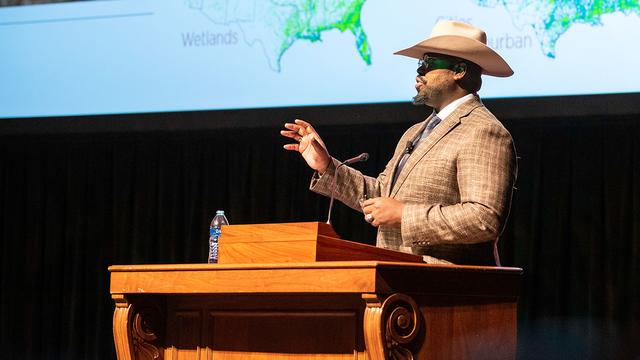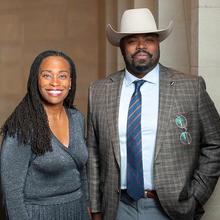Birds are a bellwether of what is happening in the environment, and we should listen to them, according to Marshall Johnson, chief conservation officer at Audubon.
“At Audubon, we like to say that ‘birds tell us.’ Birds are telling us they’re in trouble. And if they’re in trouble, we are too,” said Johnson to an audience at the University of Minnesota last week, as the latest speaker in the Humphrey School of Public Affairs’ Advancing Climate Solutions. Now Policy Series, which is geared to mobilize civic engagement on the climate crisis.
Audubon is a century-old environmental organization dedicated to the conservation of birds and their natural habitats. As the organization’s chief conservation officer, Johnson leads strategic direction for hemispheric-wide conservation work to address the biodiversity crisis facing birds.
Watch video of the event View photo gallery
North American birds face a dire future if the current pace of global climate change continues. Two-thirds of American bird species are at risk, Johnson said, including Minnesota’s state bird, the common loon. But if we take action now, he added, we can help improve the chances for the vast majority of those species at risk.
Despite the discouraging predictions about the damage being done by the climate crisis, Johnson said he remains optimistic about the future – because of birds and the people who care about them.
Call to action for birders
“There exists an incredibly large and influential constituency for birds and climate,” said Johnson, referring to the estimated 47 million birders in the United States. Birdwatching is the second fastest growing hobby in America, and birds are nonpartisan, he said.
“These 47 million Americans are passionate about birds, and care about their habitat, and invest billions in their passion. What if we could organize, empower and mobilize this constituency?”
To reduce greenhouse gas emissions and protect bird habitat at the same time, Johnson said we need to speed up the transition to renewable energy sources, leverage the power of healthy ecosystems that provide natural protections for bird habitat, sequester carbon out of the atmosphere through natural means, and change our food culture.
Accomplishing those goals will require collaboration among major players such as environmental groups, energy providers, landowners, farmers and ranchers, and government at all levels.
Key action steps
Johnson offered a few specific recommendations:
- Siting renewable energy projects such as solar and wind farms more carefully, to better protect birds and their habitats.
- Protecting wetlands, grasslands, and natural floodplains, which can draw carbon out of the atmosphere.
- Developing effective partnerships with ranchers and farmers to preserve bird habitat and emphasize soil health. Audubon has a Conservation Ranching Initiative that offers incentives for good grassland stewardship through a certification label on beef products
- Revolutionizing the federal Farm Bill to incentivize change, focus on regenerative agriculture, and preserve biodiversity
As for what individuals can do to help birds survive, Johnson suggests caring for birds in your own backyard, especially for species who may stop over during seasonal migration. Find the best plants for birds in your area on the Audubon website.
Johnson also recommends that consumers become more intentional about the food they buy, by learning how it’s produced and by supporting ranchers and farmers who are using sustainable practices.
About Advancing Climate Solutions. Now.
The Advancing Climate Solutions. Now. Climate Policy Series seeks to engage and energize students throughout the University of Minnesota, as well as residents across the state, to become part of the solution to climate change through policy and advocacy.
The Humphrey School developed the series and the Swain Climate Policy Fund to honor retired government, business, community, and University of Minnesota leader Tom Swain. The fund supports efforts to host public lectures featuring world-renowned climate experts and champions, policy-focused student internships and research initiatives, and opportunities for participants to learn how to be more effective climate stewards through both individual and collective action.



